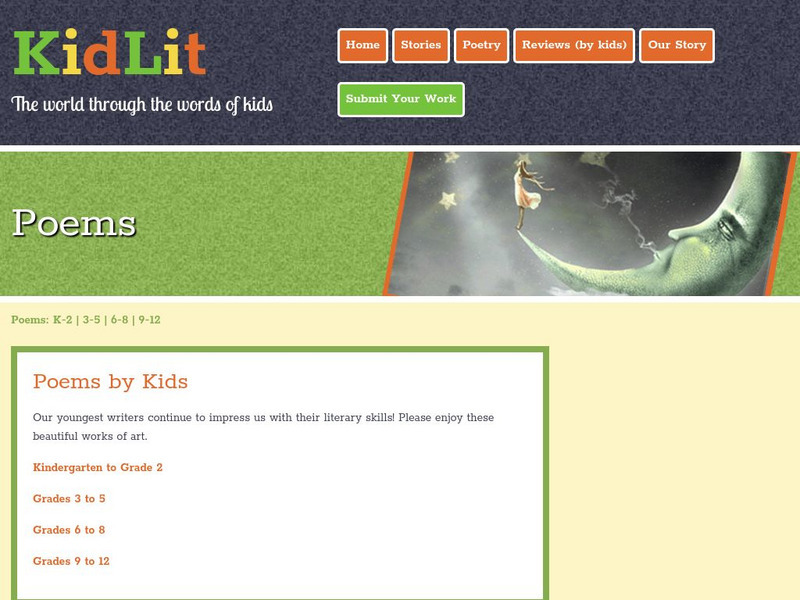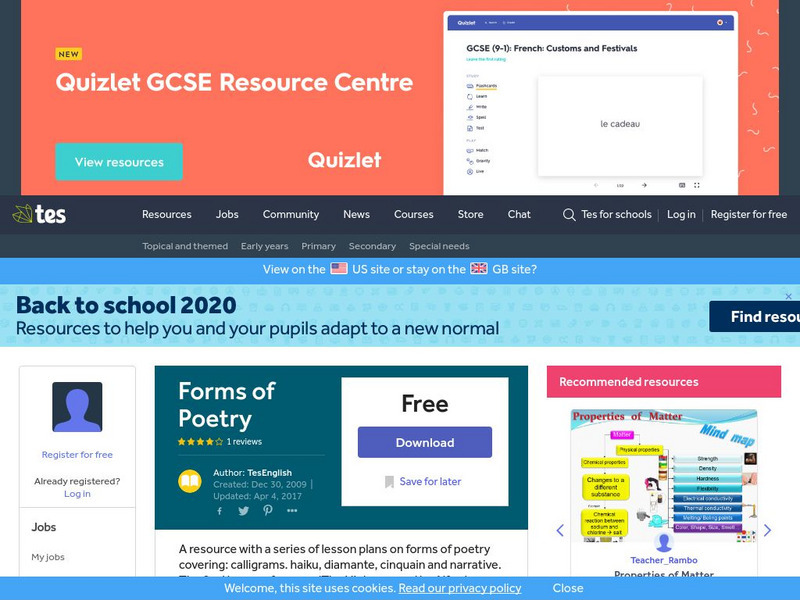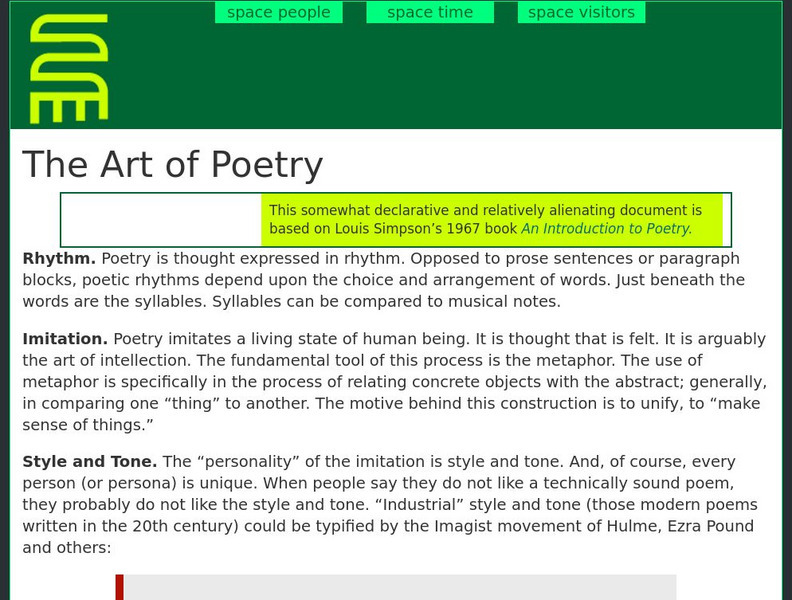Hi, what do you want to do?
ReadWriteThink
Read Write Think: In the Poet's Shoes: Performing Poetry and Building Meaning
Build a greater understanding of poetry and poet's voice. Develop and interpret a poem for a oral performance. Links include presentation rubrics and participation rubric.
ReadWriteThink
Read Write Think: World Poetry Day Activity
A classroom activity/lesson plan which marks World Poetry Day. Allows students to discuss, appreciate, and respond to different types of poetry, and includes web links and an annotated bibliography. From March 21, 2007.
ReadWriteThink
Read Write Think: Discovering Traditional Sonnet Forms
This lesson allows students read various sonnets and chart the basic characteristics of the poem, using their observations about traditional sonnet forms. After, students write original sonnets, using one of the poems they have analyzed...
ReadWriteThink
Read Write Think: Poetic Form and Structure
This online lesson makes use of concrete poems to teach the structure and form of poetry. Uses a "Columbus Day," theme for the lesson, but can be used any time of the year.
ReadWriteThink
Read Write Think: Strategy to Define: Identify Poetic Terms
Online lesson plan offers teachers the ability to teach a "Four-square," strategy technique for poetic terms. Students explore websites and define terms such as alliteration, assonance, simile, and rhyme.
PBS
Pbs: Interactive Poetry
What is interactive poetry? Use this website to learn more about this form of poetry.
University of Victoria (Canada)
The U Vic Writer's Guide: Literary Term: Ballad
The University of Victoria's English department gives a comprehensive definition of the "ballad" poetic form. Short examples included.
University of Victoria (Canada)
The U Vic Writer's Guide: Literary Term: Elegy
The University of Victoria's English department gives a comprehensive definition of the "elegy" poetic form. Example included.
University of Victoria (Canada)
The U Vic Writer's Guide: Literary Term: Epics
The University of Victoria's English department gives a comprehensive definition of the "epic" poetic form. Short examples included.
University of Victoria (Canada)
The U Vic Writer's Guide: Literary Term: Free Verse
A concise and thorough explanation of the term "free verse" in poetry. Provides a definition, differentiation from "blank verse," and an example from Walt Whitman.
University of Victoria (Canada)
The U Vic Writer's Guide: Literary Term: Meter
"Meter" in poetry is defined on this webpage. The different types of meter are explained and examples are given.
University of Victoria (Canada)
The U Vic Writer's Guide: Literary Term: Ode
The University of Victoria's English department gives a comprehensive definition of the "ode" poetic form. Short examples included.
University of Victoria (Canada)
The U Vic Writer's Guide: Literary Term: Sonnet
The University of Victoria's English department gives a comprehensive definition of the "sonnet" poetic form.
University of Oregon
Pizzaz, Creative Writing & Storytelling: Bi Directional Spiraled Poems
This PIZZAZ (People Interested in Zippy and ZAny Zcribbling) lesson plan will engage students in writing twist poems. Examples of ideas for these types of poems are provided. Variations of twist poems are listed as a way to provide for...
PBS
Pbs: Language Arts: Lesson Plans: Language Arts: Shakespeare's Sonnets
The purpose of this lesson is to help students cope with unfamiliar language in Shakespeare's sonnets and to help them understand and appreciate both what he says and how he says it.
Houghton Mifflin Harcourt
Holt, Rinehart and Winston: Elements of Literature: Poetry You've Got Rhythm [Pdf]
A short but informational worksheet for students on the rhythmical sounds of poetry. Includes information about the different types of meter and feet, and allows students to make connections and analysis.
Writing Fix
Writing Fix: The Di Ku And/or the Tri Ku [Pdf]
Students use a basic haiku structure to create di-ku and tri-ku poems to demonstrate understanding of a topic. Directions and examples of each are provided.
TES Global
Tes: Teaching Shakespeare: Themes: Love: Sonnet 116 Power Point
[Free Registration/Login Required] This is a lesson for teaching Shakespeare's Sonnet 116 including the structure of sonnets, understanding the meaning of the sonnet, and finding important points made about love in the Sonnet, finding...
Other
Kids Lit: Poems by Kids
Student poets have contributed their poems for publication on this site. Read through the poems and contribute your own.
TES Global
Tes: Forms of Poetry
[Free Registration/Login Required] These Several lessons provide students with an understanding with different types of writing forms: calligram, cinquain, diamante, haiku, and narrative.
Other
Kintespace: The Art of Poetry
This site is an analysis of rhythm, imitation, style, tone, and technique of poetry. References to imagists and their works are also included
ClassFlow
Class Flow: Poetry Figurative Language
[Free Registration/Login Required] This flipchart discusses various forms of poetry and gives examples of each. Figurative language is explored as a way of determining the meaning of a piece of literature.
Sophia Learning
Sophia: Breaking the Line: An Exercise for Revision in Poetry
Lesson on crafting and revising lines of poetry. Lineation and enjambment are defined and explored. A Robert Creeley poem is analyzed, and a video of his poem is presented. [1:31]
ReadWriteThink
Read Write Think: Poetry: Sound and Sense
Lesson that gently encourages the teaching of poetry in "nonthreatening" ways. Stresses reading and listening, discussion, and the examination of the sound and sense of poetry.







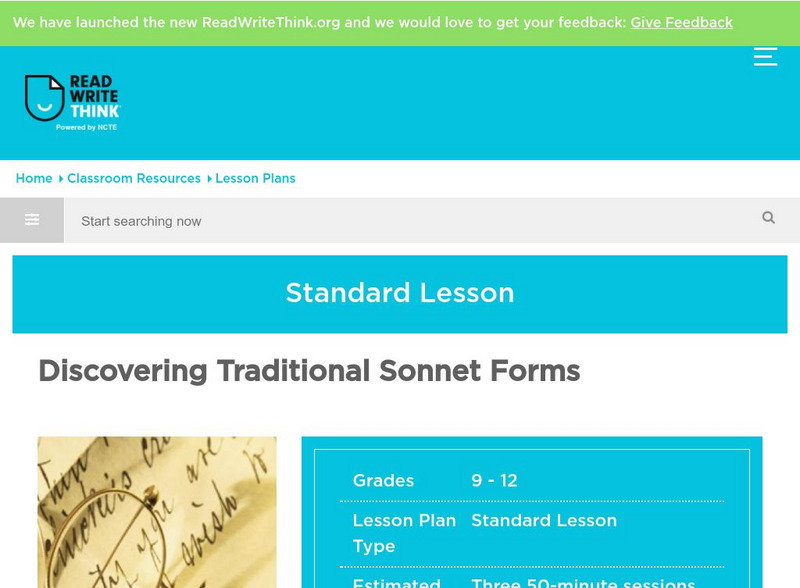

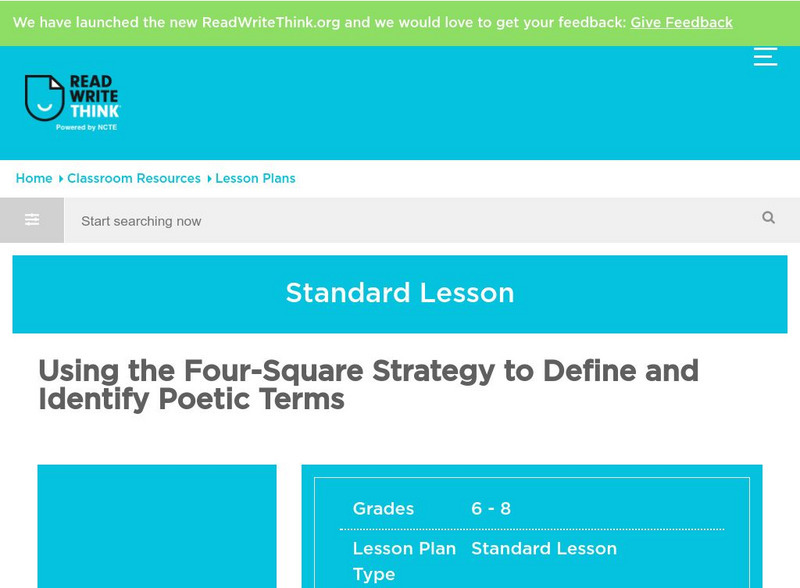


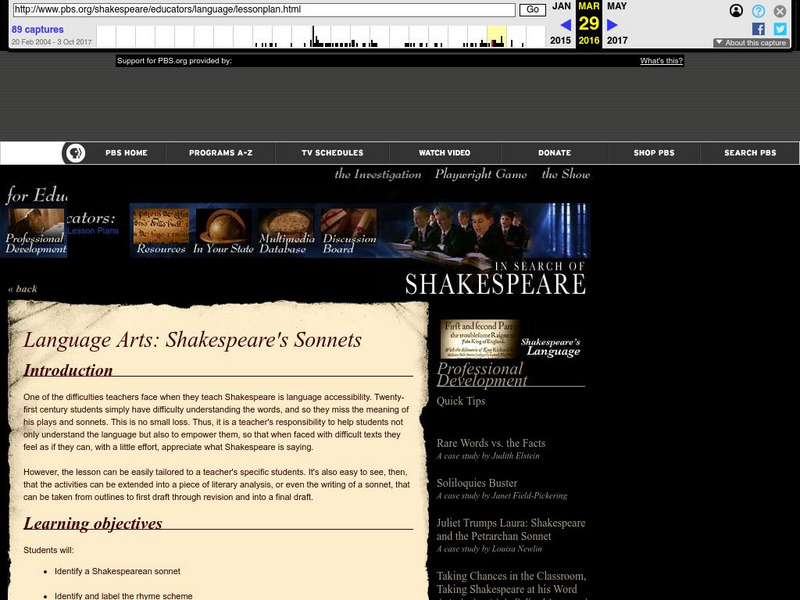
![Holt, Rinehart and Winston: Elements of Literature: Poetry You've Got Rhythm [Pdf] Unit Plan Holt, Rinehart and Winston: Elements of Literature: Poetry You've Got Rhythm [Pdf] Unit Plan](http://lessonplanet.com/content/resources/thumbnails/410060/large/bwluav9tywdpy2symdiwmduymc03otczlw41bjdpdy5qcgc.jpg?1589985147)

